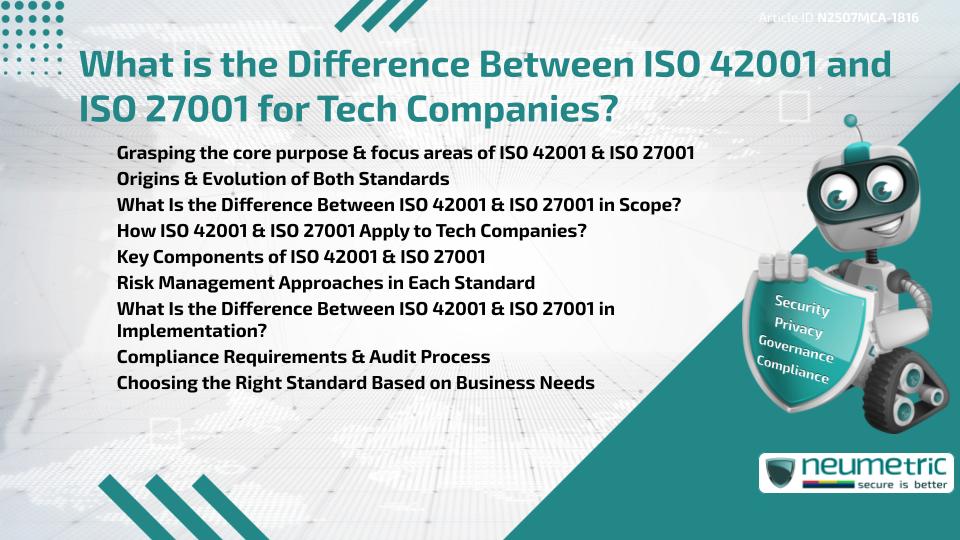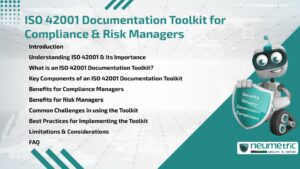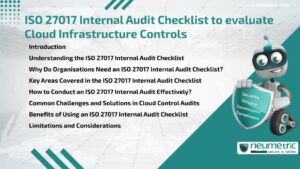Table of Contents
ToggleIntroduction
As Artificial Intelligence [AI] & Cybersecurity converge in modern business, organisations must decide which Compliance frameworks best support their goals. For tech companies, two prominent standards stand out: ISO 42001 & ISO 27001.
ISO 42001 & ISO 27001: While both aim to structure & safeguard organisational processes, they serve distinct purposes. This article breaks down their origins, scope, & how each Framework supports tech businesses in managing AI & Information Security Risks.
Grasping the core purpose & focus areas of ISO 42001 & ISO 27001
ISO 27001 serves as a trusted international framework for creating, implementing & managing a robust Information Security Management System [ISMS]. It is designed to safeguard the confidentiality, integrity & availability of data.
ISO 42001, on the other hand, is the first international Standard for establishing an AI Management System [AIMS]. It provides guidance to organisations on how to responsibly develop, deploy & govern AI Systems.
ISO 42001 & ISO 27001: ISO 27001 is centred around securing information, whereas ISO 42001 is structured to ensure responsible management of AI systems.
Explore ISO guidance here: https://www.iso.org/
Origins & Evolution of Both Standards
ISO 27001 was first introduced in 2005 to help organisations protect digital & physical information assets. It has since evolved through multiple updates to address changing Cyber Threats.
ISO 42001 was introduced in 2023 to address increasing worldwide concerns surrounding the ethical development & use of AI systems.It fills a Governance gap where traditional Information Security standards fall short.
ISO 42001 & ISO 27001: Their development highlights a shift in regulatory priorities — moving from data protection to ensuring algorithmic integrity.
Learn more at: https://www.nist.gov/itl/ai-Risk-management-Framework
What Is the Difference Between ISO 42001 & ISO 27001 in Scope?
ISO 27001 covers a broad range of Information Security practices, including Access Control, encryption, Business Continuity & Incident Response.
ISO 42001 is tailored to AI-specific concerns like bias detection, data quality in machine learning, transparency & human oversight.
ISO 42001 & ISO 27001: The former concentrates on managing AI governance, while the latter is dedicated to protecting digital information assets.
Explore scope details at: https://www.enisa.europa.eu/topics/Threat-Risk-management
How ISO 42001 & ISO 27001 Apply to Tech Companies?
Tech companies that build or use AI Systems benefit from ISO 42001 by demonstrating responsible AI use & Governance.
ISO 27001 is better suited for tech firms handling sensitive Customer or business data that must be kept secure.
ISO 42001 & ISO 27001: It depends on whether your focus is AI Risk or Data Security — or both.
Key Components of ISO 42001 & ISO 27001
Both standards use a Plan-Do-Check-Act [PDCA] model, but their components vary.
ISO 27001 includes controls such as:
- Asset management
- Access restriction
- Cryptography
- Security Policies
ISO 42001 includes elements like:
- AI lifecycle management
- Data quality controls
- Transparency documentation
- Stakeholder engagement
ISO 42001 & ISO 27001: Each Standard addresses different domains with specific implementation strategies.
Risk Management Approaches in Each Standard
ISO 27001 focuses on identifying Threats to information systems & minimising data-related Risks.
ISO 42001 expands the Risk lens to include unintended outcomes of AI Models, such as algorithmic bias or lack of accountability.
ISO 42001 & ISO 27001: ISO 27001 protects information assets, whereas ISO 42001 addresses ethical & operational risks associated with AI systems.
Visit https://edpb.europa.eu/ for broader regulatory context.
What Is the Difference Between ISO 42001 & ISO 27001 in Implementation?
Both standards require Top Management involvement, regular Audits & documented controls. However:
- ISO 27001 emphasises data protection, management of IT controls & effective incident response.
- ISO 42001 includes impact assessments, explainability checks & human-AI interaction Policies
ISO 42001 & ISO 27001: Implementation requires similar structure but diverges in content & operational focus.
Compliance Requirements & Audit Process
ISO 27001 Certification requires external audits by accredited bodies & continuous internal monitoring.
ISO 42001 also involves Third Party certification, but with emphasis on transparency reports & AI impact evaluation.
ISO 42001 & ISO 27001: Both involve external validation but differ in the type of evidence auditors look for.
Choosing the Right Standard Based on Business Needs
Tech companies developing AI-driven products should consider ISO 42001 to demonstrate ethical design & Governance.
Organisations that emphasise secure data management & regulatory compliance may consider ISO 27001 to be more applicable to their needs.
ISO 42001 & ISO 27001: Choosing the right one depends on your core Risk areas, operational model & Customer expectations.
Takeaways
- ISO 27001 is aimed at securing information systems, while ISO 42001 provides a framework for governing the responsible use of AI systems.
- Both use a structured approach for implementation & audits
- Gaining clarity on the key differences between ISO 42001& ISO 27001helps businesses align with the right standards
- Tech companies may benefit from one or both depending on their operations
FAQ
What is the difference between ISO 42001 & ISO 27001 in terms of business value?
ISO 27001 enhances Data Security while ISO 42001 builds trust in AI Systems. Each adds value in different areas of a tech business.
Is it feasible for an organisation to implement ISO 42001 & ISO 27001 standards together?
Yes, organisations can adopt both standards to address AI governance & information security simultaneously.
What is the difference between ISO 42001 & ISO 27001 for AI startups?
AI startups benefit more from ISO 42001 as it addresses AI-specific Risks, while ISO 27001 helps if they also handle Customer Data.
Do ISO 42001 & ISO 27001 include any shared or overlapping control measures?
They share structural similarities like Risk Management & leadership involvement but differ in control focus & outcomes.
In what ways do the audit processes differ between ISO 42001 & ISO 27001?
ISO 27001 audits focus on information protection. ISO 42001 audits examine AI lifecycle transparency & ethical considerations.
What is the difference between ISO 42001 & ISO 27001 in global recognition?
ISO 27001 is more widely adopted today, but ISO 42001 is gaining global relevance as AI Regulations evolve.
Need help?
Neumetric provides organisations the necessary help to achieve their Cybersecurity, Compliance, Governance, Privacy, Certifications & Pentesting goals.
Organisations & Businesses, specifically those which provide SaaS & AI Solutions, usually need a Cybersecurity Partner for meeting & maintaining the ongoing Security & Privacy needs & requirements of their Clients & Customers.
SOC 2, ISO 27001, ISO 42001, NIST, HIPAA, HECVAT, EU GDPR are some of the Frameworks that are served by Fusion – a centralised, automated, AI-enabled SaaS Solution created & managed by Neumetric.
Reach out to us!





